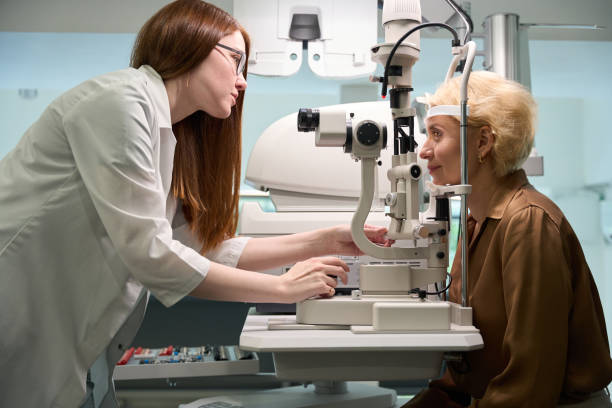Binocular vision dysfunction refers to a condition where the eyes have difficulty working together as a team, leading to issues with depth perception, eye coordination, and visual comfort. While often overlooked, binocular vision dysfunction can significantly impact an individual’s quality of life, affecting tasks such as reading, driving, and even simple activities like walking or watching television.
For those living with binocular vision dysfunction, everyday activities can pose challenges. From experiencing eye strain and headaches to difficulty focusing and judging distances accurately, individuals with this condition often find themselves navigating a world that feels visually disjointed and uncomfortable. If you are looking for binocular vision specialist near me, you are at the right place.
Understanding Binocular Vision Dysfunction
Binocular vision refers to the ability of both eyes to work together seamlessly, allowing us to perceive depth and three-dimensional space. This synchronized teamwork between the eyes is crucial for tasks requiring accurate depth perception, such as driving, playing sports, or even pouring a glass of water. When binocular vision is compromised, individuals may experience difficulties in accurately judging distances and spatial relationships, leading to visual discomfort and reduced performance in daily activities.
Binocular vision dysfunction can arise from various factors, including muscle imbalances, eye misalignment, and neurological conditions affecting the visual system. Common symptoms may include double vision, eye strain, headaches, difficulty concentrating, and reduced visual clarity. These symptoms often worsen with prolonged visual tasks or under challenging viewing conditions, further impacting an individual’s ability to function comfortably and efficiently.
Diagnosis of Binocular Vision Dysfunction
Diagnosing binocular vision dysfunction requires a thorough and comprehensive eye examination conducted by a skilled eye care professional. These examinations go beyond standard vision screenings and include eye alignment, muscle balance, and binocular vision function assessments.
By evaluating how the eyes work together as a team, an ophthalmologist or optometrist Cincinnati can identify underlying issues contributing to binocular vision dysfunction and develop targeted treatment plans accordingly. Both optometrists and ophthalmologists play essential roles in identifying and evaluating binocular vision issues. Specialists utilize various techniques and tests to accurately diagnose binocular vision dysfunction. These may include cover tests to assess eye alignment, stereopsis tests to evaluate depth perception, and measurements of eye movements and coordination.
Treatment Options for Binocular Vision Dysfunction
Below, you can find different treatment options available for Binocular Vision Dysfunction:
1. Prism lenses and vision correction techniques
One of the primary treatment options for binocular vision dysfunction involves the use of prism lenses to help align and balance the eyes more effectively. These specialized lenses can compensate for muscle imbalances and eye misalignment, improving visual comfort and reducing symptoms such as double vision and eye strain. Additionally, vision correction techniques may be prescribed to optimize visual clarity and comfort, including prescription glasses and contact lenses.
2. Vision therapy programs
Vision therapy, or orthoptic therapy or vision training, is a non-invasive treatment approach designed to improve binocular vision through targeted exercises and activities. These therapy programs are tailored to address specific binocular vision challenges, such as eye coordination, focusing abilities, and depth perception. Vision therapy can significantly improve the symptoms and functional abilities of individuals with binocular vision dysfunction by retraining the visual system and enhancing eye-brain communication.
3. Surgical interventions and other advanced treatment modalities
In cases where structural abnormalities or underlying eye conditions cause binocular vision dysfunction, surgical interventions may be recommended to correct these issues. Procedures such as strabismus surgery to realign the eyes or neuro-ophthalmic surgery to address neurological disorders may be performed to improve binocular vision function. Additionally, advancements in technology, such as neuro-optometric rehabilitation and specialized visual aids, offer alternative treatment modalities for individuals with complex binocular vision issues.
Treatment for Binocular Vision Dysfunction at Madeira Optical
Madeira Optical, located in Cincinnati, offers Binocular Vision Dysfunction (BVD) treatment. A comprehensive evaluation by a skilled optometrist at Madeira Optical is crucial for diagnosing BVD, as its symptoms overlap with those of other eye conditions. The evaluation typically involves a range of tests that measure eye alignment, visual acuity, and eye movements.
Based on the results, the optometrist can determine the extent of the dysfunction and recommend a personalized treatment plan. BVD treatment at Madeira Optical typically involves using specialized lenses, prisms, or vision therapy. The goal is to help the eyes work together more efficiently, reducing symptoms and improving overall vision.
It’s important to address BVD timely, as leaving it untreated can lead to more severe conditions such as amblyopia, also known as lazy eye. Therefore, if you suspect BVD or are experiencing related symptoms, scheduling a comprehensive eye exam at Madeira Optical is recommended.
Their team includes:
- Dr. Jenna Stoffel, OD: She specializes in myopia management, ocular disease care, and surgical co-management.
- Dr. Jennifer Kritzer, OD: An active member of the AOA, OOA, and Cincinnati Optometric Association.
- Dr. Cheryl Adams, OD: She focuses on pediatric and binocular vision care.
- Dr. Malinda Pence, OD: She is passionate about providing family eye care in a community-based practice.
Location and Hours: Madeira Optical is located at 6725 Miami Ave. Ste 101, Madeira, OH, 45243. They are open from Monday to Thursday from 09:00 am to 6:00 pm and Friday to Saturday from 09:00 am to 2:30 pm. They are closed on Sunday.
Phone: You can reach them at (513) 561-7076.
Email: [email protected]
Conclusion
Cincinnati’s expertise in diagnosing, treating, and managing binocular vision dysfunction is unparalleled, offering individuals with this condition hope for improved outcomes and enhanced visual comfort. With a focus on personalized care, innovative treatment modalities, and collaborative approaches, Cincinnati’s binocular vision specialists are dedicated to helping patients overcome their visual challenges and reclaim their quality of life.
For individuals experiencing symptoms of binocular vision dysfunction, seeking specialized care from Cincinnati’s leading eye care professionals is the first step toward finding relief and achieving optimal visual function. With their expertise, dedication, and commitment to patient-centered care, Cincinnati’s binocular vision specialists are ready to guide individuals on their journey to improved visual comfort and well-being.









